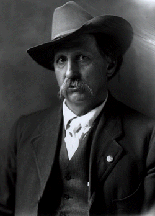Lucullus V. McWhorter
| Lucullus Virgil McWhorter | |
|---|---|
 |
|
| Born | January 29, 1860 Harrison County, West Virginia |
| Died | October 10, 1944 Prosser (North Yakima), Washington |
| Occupation | Farmer, Writer, Native-American-civil-rights advocate |
| Language | English |
| Nationality | US |
| Education | Self-educated |
| Genre | History, Anthropology |
| Subject | Nez Perce War, Yakama Nation's culture and spiritualism, Nez Perce culture |
| Notable works |
Hear Me, My Chiefs |
| Notable awards | Was given a name by the Yakama Nation, "Big Foot". Adopted into the Yakima Nation and given another name, Hemene Ka-Wan (Old Wolf). |
| Spouse |
Adelia A. Swisher (married 1883) |
| Children |
Ovid Tullius McWhorter (born 1884) |
Hear Me, My Chiefs
Adelia A. Swisher (married 1883)
Ovid Tullius McWhorter (born 1884)
Iris Oresta McWhorter (born 1886)
Lucullus Virgil McWhorter (January 29, 1860 – October 10, 1944) was an American farmer and frontiersman who documented the historical Native American tribes in West Virginia and the modern-day Plateau Indians in Washington state.
His studies were anthropological, documenting the culture and history of the tribes. He became politically active as he represented the Plateau Indians against mistreatment by the United States federal government and published accounts to make this mistreatment known to the public. He was considered an amateur in his day, but today his anthropology studies are deemed important enough to have a permanent home in Washington State University's special collections department. Current scholars consider his work as "significant" in his field, and helping to preserve the cultural heritage of the Native American tribes of the Columbia Basin. His papers are an "essential and valued resource", and the collection of his papers is "widely and intensively used." After more than 60 years, the work he did remains "extremely valuable for outreach and teaching purpose."
His work earned praise from Professor Alanna Kathleen Brown in her review of a new biography of him, Voice of the Old Wolf: Lucullus Virgil McWhorter and the Nez Perce Indians, in the Universe Magazine, Spring 1997. She called him an "amazingly interesting, courageous, dedicated, and insightful man." As to his accomplishments, she said:
For over 400 years, while Euroamericans were moving west, they pretended that they settled a "wilderness." When confronted by native peoples, the vast majority asserted the privileges of a superior race, using force and law to take what they wanted, justifying their greed as the manifestation of divine will. For Indian peoples, their coming meant the largest genocide in human history. McWhorter understood, and was appalled. He dedicated his energies to comprehending the cultures of the Indian tribes who surrounded him, and he committed himself to recounting the legends and epic personal stories of those he saw passing. McWhorter also continually argued for fair treatment and decency towards Indians whenever he could be an advocate. For this love, he was ridiculed and isolated by many of his own white peers.
...
Wikipedia
